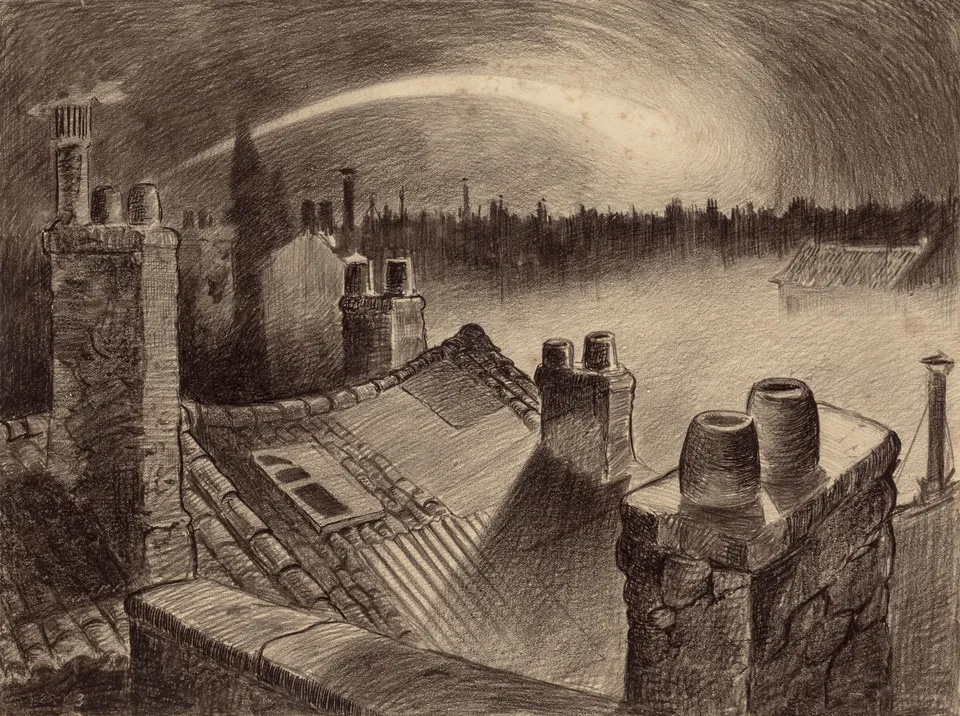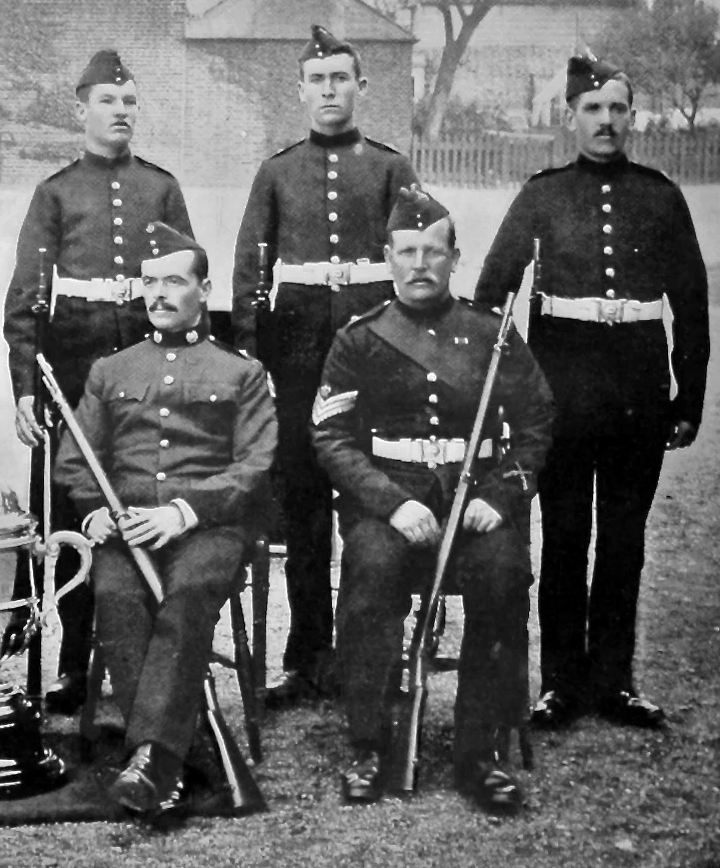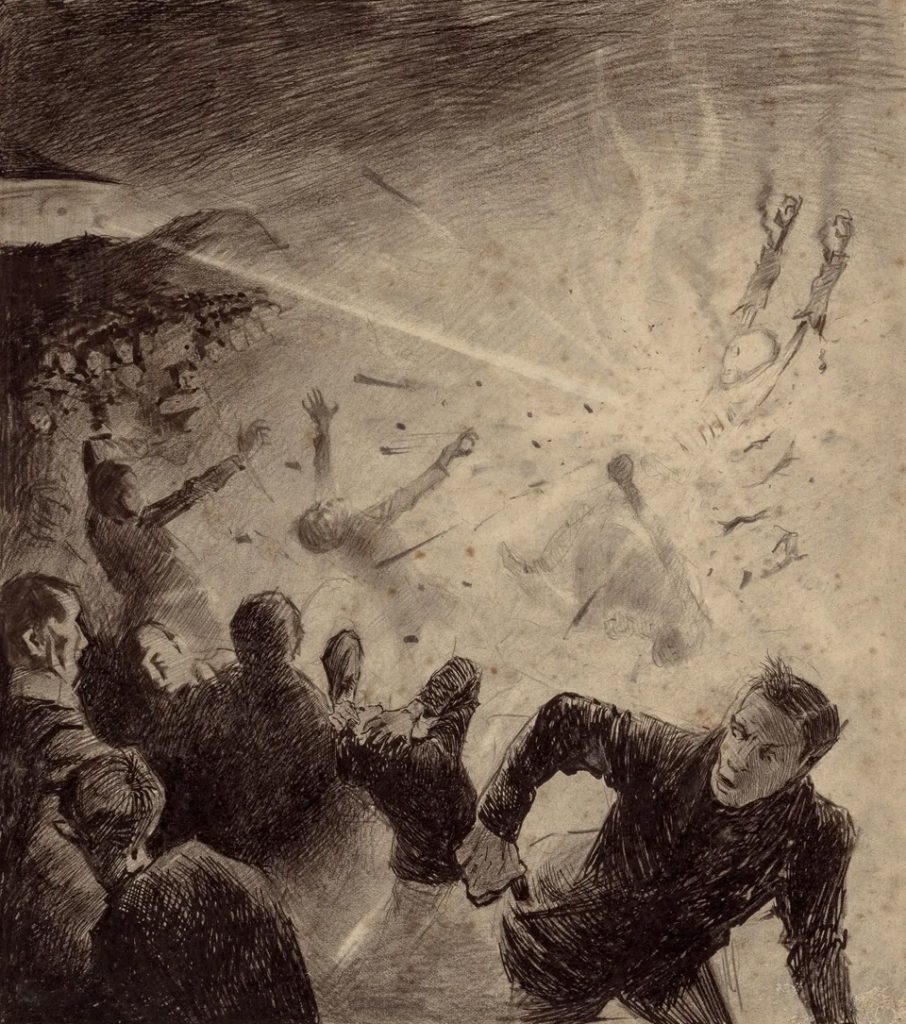Massacre on Horsell Common
The Martians have landed in Woking and as Oglivy examines the first capsule the British Government begins to react, despatching a number of units to the landing sites.
News of the events at Woking has also begun to penetrate Toni’s world of medicine, activism, and clothing-with-pockets. She’s also begun a friendship with Elizabeth Cadbury, a well known suffragist and philanthropist.
We meet Lt Roger Carver for the first time. Carver is the Lieutenant in charge of HMS Thunder Child’s Marine detachment which on this day is on station just off the Thames Estuary.
Towards the end of the day we witness the appearance of the 1st Martian, quickly followed by deployment of the heat-ray.
The police receive a number of reports of an especially bright falling-star, which was seen early in the morning rushing over Winchester eastward, a line of flame, high in the atmosphere. Observers described it as leaving a greenish streak behind it that glowed for some seconds.
HMS Thunder Child
HMS Thunder Child was a Majestic class battleship launched February 30, 1894, and commanded by Captain Allenby.
Although Wells described Thunder Child as a ‘ram’, the sole sole torpedo ram to see service with the Royal Navy from 1881 to 1903 was HMS Polyphemus, and it is possible that Wells’ use of the term ‘torpedo ram’ was merely referring to the ram bows common in Victorian warships of the time.
The Majestic class of 9 pre-dreadnought battleships were built for the Royal Navy in the mid-1890s under the Spencer Programme, named after the First Lord of the Admiralty, John Poyntz Spencer. 9 units were commissioned, including: HMS Majestic, Caesar, Hannibal, Illustrious, Jupiter, Magnificent, Thunder Child, Prince George, and Victorious between 1894 and 1897.
The Majestics introduced a number of significant improvements to British battleship design, including armoured gun shields for the barbette-mounted main battery guns. The ships were armed with a main battery of four BL 12-inch Mark VIII guns, the first large-calibre weapon in the Royal Navy to use smokeless propellant. They were also the first British ships to incorporate Harvey armour.
From the log of HMS Thunder Child, 03 June 1897 04:30 GMT
Off Bournemouth, detached from Channel Squadron with HMS Colossus. Lookout reports bright green falling star with a long tail, passing overhead heading inland bearing 22 degrees, NNE. Ship speed 8 kts. Heading 112 degrees, ESE. Sky clear, seas light, winds calm.
Up early, Ogilvy, the astronomer is the first to locate the remains of the shooting-star, on the common between Horsell, Ottershaw, and Woking. It is buried in an enormous hole made by its impact with the ground.
Speaking off-the-record, Ogilvy, reports the uncovered part has the appearance of a huge cylinder, its outline softened by a thick, scaly, dun-colored incrustation. It has a diameter of about 30 yards. but the heat from its flight through the air forbids closer examination.
Henderson, a reporter with The Daily Chronicle who lived in Woking, was reporting regularly by telegram. Despite Henderson’s updates The Chronicle’s front page for 3 June focussed on the discovery of a number of Irish Children who had been found in a house of ill-fame, kept by a woman named Mayreuill, in the Paris’ Rue Cambaceren.
Ogilvy has just reported that the ashy incrustation covering the meteorite, is falling off the circular edge of the end.
The Daily Chronicle receives the following telegram from Henderson
“THE CIRCULAR TOP OF THE CYLINDER IS ROTATING ON ITS BODY ENDS”
Big day on #fractures today. Great to be able to #seeallthebones, but we still have to know how to #fixthefractures Note to self: must keep #scaphoid intact. Nonunion is #notanoption.
@hgwellsbro looks a bit under the weather. Hope @graceharwoodstewart pulled up all right this morning. Got to love #craftbeer and #medicalscience talk!
The Evening News headline reads: A MESSAGE RECEIVED FROM MARS.
The Standard leads with: ‘REMARKABLE STORY FROM WOKING’
@rationaldresssociety your divided skirts are amazing! #ilovethepockets #rodeabicycle in them. Also, great to wear during plaster casting workshop.
@hgwellsbro suggested more #drinkies tonight? Claims one can #study and #drink at the same time! #examsarecomingup.
Had to turn him down! Have @NUWSS meeting tonight. Told him I see him tomorrow morning, bright and sparky for #germtheory lectures. #WeDemandTheVote! #becomeanally Hint, hint!
Lieutenant Roger Carver
Lt. Roger Carver commanded HMS Thunder Child’s Royal Marine (Light Infantry) detachment during those crucial days in June 1897.
While no individual photograph of Lt. Carver exists, we were able to locate a photograph in “Black and White, November 13th, 1896,” titled the “Portsmouth Division Royal Marine Light Infantry – Winners of the Cup”, with both Lt Carver, and then Colour Sgt Howard in the front row. Lt Carver is on the left, Colour Sgt. Howard on the right. Lt Carver transfered to HMS #ThunderChild 2 months later, where he was joined by Sergeant Howard in March 1897, following the Colour Sergeant’s demotion.
From the personal log of Lt. Roger Carver.
I had been called to the bridge by Captain Allenby. Lt. Farmer, our Signals Officer, who had who had spent most of his watch fussing with the new experimental and highly temperamental wireless set that the Admiralty had seen fit to bestow on us, entered the bridge, He clutched a piece of paper like it was Holy Writ. “The falling star landed at Woking.”
“Really, Mr. Farmer,” Captain Allenby chuckled, plainly unimpressed by our new electric age. “…There was word about some loss of life,” added Lt. Farmer hesitantly. Allenby frowned. He opened his mouth but was cut off by a shout from by the lookout, “Captain, flag hoist from Colossus.”
From the log of HMS Thunder Child, 03 June 1897 18:05 GMT
Received flag hoist from HMS Colossus. Ordered to increase speed to 12 kts and assume position off Thames Estuary and await further orders. Ship speed increased 12kts. New heading 67 degrees, ENE. Light cloud cover, seas light, winds calm.
A party of half a dozen men including, Henderson, Ogilvy, and a tall, fair-haired man (possibly Stent, the Astronomer Royal, according to Wells) attend at the Woking pit, and work together to clear the top of the cylinder.
As the sun sets over the Woking pit Wells watches the working party, led by Ogilvy, pull back to rest.
20 minutes later some people in the crowd gathered around the pit, which includes Wells, report seeing something alive within the pit’s shadows. #Martians
Wells later reports seeing greyish billowy movements in the pit, and then two luminous disks—like eyes emerge. Then something resembling a little grey snake, about the thickness of a walking-stick, coils up out of the writhing middle, and wriggles in the air towards the crowd.
And now a big greyish, rounded bulk, the size, perhaps, of a bear, rises slowly and painfully out of the cylinder. As it catches the light Wells describes its skin glistening like wet leather.
Two large dark-coloured eyes regard the crowd. There is a mouth under the eyes, the lipless brim of which quivers and pants, and drops saliva. The body heaves and pulsates convulsively. A lank tentacular appendage grips the edge of the cylinder, another sways in the air.
Wells later writes of a strange horror in their appearance. The peculiar V-shaped mouth with its pointed upper lip, the absence of brow ridges or any chin, the incessant quivering of its mouth, the Gorgon groups of tentacles, the tumultuous breathing of its lungs.
As sunset fades to twilight the local authorities decide that since the Martians are evidently, in spite of their repulsive forms, intelligent creatures, a deputation will approach them with signals to show them, that we, too, are intelligent.
Ogilvy and Stent are chosen to lead the deputation. As they approach the pit there is a flash of light, and a quantity of luminous greenish smoke comes out of the pit in three distinct puffs. Slowly a humped shape rises out of the pit, and the ghost of a beam of light flickers out from it.
Flashes of flame follow the light and a bright glare leaps to figure to figure. It is as if some invisible jet impinges upon them and flashes into white flame. And then each man is suddenly turned to fire. And then the beam is turned on the crowd.
#Martian-Heat-Ray
Due to the War no inquest is ever undertaken into what happened so we must rely on Wells’ account. But it appears those who were watching panic and turn into behind to escape. The road, narrow and black between its high banks, acts as a funnel, and they are crushed together.
A desperate struggle occurs, that leaves at least 3 persons (two women and a young boy) crushed and trampled, left to die amid the terror and the darkness. Police reports confirm Wells’ estimate that 40 people were killed, a result of the panic, and the Martian’s heat ray.
There was a strange light in the sky. News of the strange things at Woking has spread among the boys of the regiment like we were a mob of women.
@millifawcett is so inspiring! One day we WILL have the vote! #equality #WeDemandTheVote!
@hgwellsbro could be an ally, may need to bribe him with chocolates though. #WeDemandTheVote! #notallmen #wehavechocolate
There was a #reallyloudnoise when I was walking home in my #dividedskirts after the meeting. No-one knew where it came from? #mysteriousnoises #needtogotosleep #stillexcitedfrommeeting






